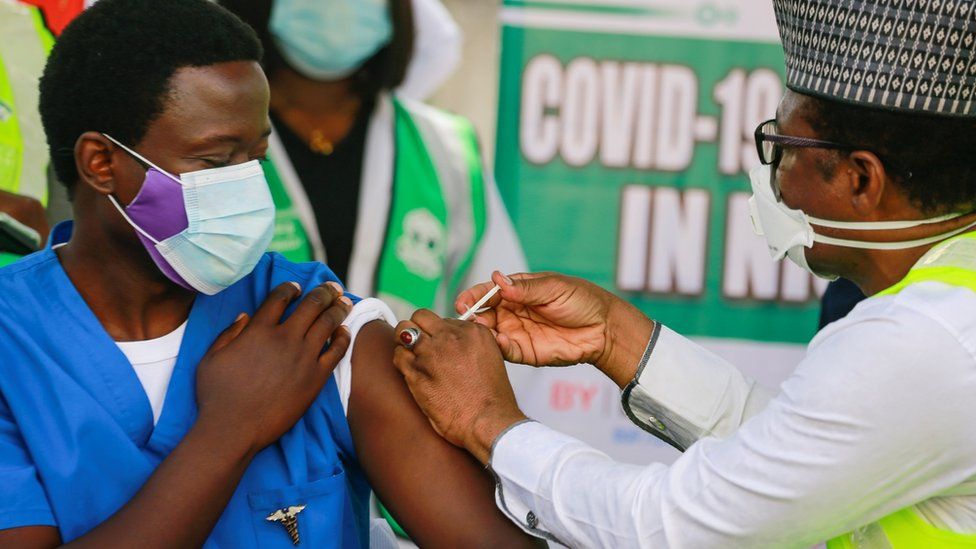Covid-19 vaccines: Why some African states have leftover doses
SharecloseShare pageCopy linkAbout sharingimage copyrightReutersDespite many African countries struggling to obtain enough Covid-19 vaccines, some have thousands of expired doses they have been unable to use.Which countries have unused vaccines?Malawi has been left with 16,400 doses of the Oxford-AstraZeneca vaccine, while South Sudan has 59,000 – all now past their expiry date, 13 April.Both countries say they have decided to destroy these consignments, donated via the African Union, despite the World Health Organization (WHO) asking for them to be kept while it investigates whether the expiry date can be safely extended.image copyrightReutersThe Democratic Republic of Congo, meanwhile, says it cannot use most of the 1.7 million Oxford-AstraZeneca doses it received under the global Covax scheme, for poorer countries.Only about 1,000 of the doses had been administered by the end of April. And most of this batch – with an expiry date of 24 June – is now being sent to Togo and Ghana, one of the countries to have already used up its initial vaccine supply.Why have vaccines not been used?The Oxford-AstraZeneca vaccine can be stored safely in normal refrigerated conditions for up to six months after production.And the African Union is now redistributing batches originally delivered to South Africa in February, with a 13 April expiry date.The South African government decided not to use them, concerned the vaccine offered insufficient protection from the variant prevalent in the country.New variants causing concern in AfricaAnd, in late March, one million doses were sold on to the African Union to give to other African countries.But some, such as South Sudan, say they were not made aware of the expiry date.Nigeria, meanwhile, said it would be unable to use all the doses in time. So some were reassigned to neighbouring Togo and Ghana. And some were even sent to Jamaica.The WHO says only Togo and The Gambia have confirmed they used all these doses by the expiry date.And information about what has happened to the rest is currently unavailable.What caused delays in using vaccines?Many countries failed to prepare adequately before receiving the vaccines, Phionah Atuhebwe, from the WHO in Africa, says.”That is one of the reasons we are seeing the slow pace of rollout,” she says.And some countries also faced financial challenges.Africa Centres for Disease Control head John Nkengasong says countries need more support to increase the numbers of health workers and obtain supplies, such as personal protective equipment.And those who have vaccines approaching or beyond their expiry date should contact the WHO or Africa CDC.”The continent as a whole knows how to vaccinate and has been vaccinating for other diseases,” he says. “But the key is how do you scale that up – and… at speed?”image copyrightReutersFor DR Congo, the former Zaire, the problem is not only weak health services but also a very poor transport network – making the delivery of vaccines to remote areas a major issue. By air, boat and foot to deliver measles vaccines in DR CongoTo complicate matters further, the country suspended its Oxford-AstraZeneca vaccine rollout in mid-March, amid safety concerns, and resumed it on only 19 April – more than a month later.What about vaccine hesitancy?Some experts and politicians blame concerns over the safety and efficacy of vaccines in general for the slow uptake in many countries in Africa – but it is hard to quantify that impact. “It took a while to convince people,” Sierra Leone Health Minister Austin Demby tells BBC News”So it is not just vaccine hesitancy, it is like [having] vaccine sceptics to start with.” image copyrightReutersMalawi virologist Gama Bandawe says mistrust of vaccines has played a role in the country being unable to use all the supplies it has received.And South Africa’s decision to stop using the Oxford-AstraZeneca vaccine, amid concerns around cases of blood clots, may have added to these doubts.”The government did the best they could – but perhaps the general public has not been as receptive as was expected,” he says. Rare blood clots – what you need to knowA study commissioned by Africa CDC on Covid-19 vaccine perceptions in 15 countries indicated a significant proportion of people had concerns around vaccine safety.On average, about 20% of respondents said they would not have a vaccine – but the proportion varied from below 10% in Ethiopia, Niger and Tunisia to 41% in DR Congo.GLOBAL SPREAD: Tracking the coronavirus pandemicSYMPTOMS: What are the symptoms of the coronavirus?VARIANTS: How worrying are the new coronavirus variants?TRACKER: Coronavirus cases in AfricaRead more from Reality CheckSend us your questions
Read more →
